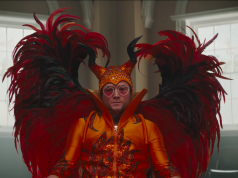“De-Lovely” keeps making the point that Cole Porter was a fun-loving, carefree man-about-town — but if that’s true, then how come all the scenes involving him and his interpersonal relationships are so dull? They tell us his joie de vivre inspired his droll songs, but you wouldn’t know it from watching. You see Robbie Williams singing the title song and you think, “Man, that’s a fun ditty. How did someone as dour as Cole Porter write it?”
All of which is unfair to the real Cole Porter, who truly WAS a bon vivant of the first order, a well-monied man who loved laughter, champagne and witty repartee, and whose songs reflected his elegant (but naughty) tastes. “De-Lovely” hints at all those things, and Kevin Kline is certainly an actor capable of portraying them — but it never really lets Kline cut loose and be himself (or, more accurately, let him be Cole Porter). Sure, even life-of-the-party types have woes and secrets and travails, but things can’t be THIS bleak, THIS regularly. If they were, the guy would never have the strength to even attend parties, let alone be the life of them. He’d be too depressed.
‘Tis a pity, for Porter was one of the most charismatic and interesting personalities of the first half of the 20th century. His name has faded away with those of the other great songwriters — most popular music today is uncreative, both musically and lyrically; it’s the performance and personality that drive a song, and no one cares who wrote the thing. Being a “songwriter” is like being a “cobbler” or a “wainwright”: Do they even still HAVE those?
Sorry, I didn’t mean to sound so old there. I’m just afraid audiences won’t appreciate who Porter was, and therefore won’t know how disappointed they should be that “De-Lovely” doesn’t do him better justice. Oh well.
Written by Jay Cocks (“The Age of Innocence,” “Strange Days”), the film was directed by Irwin Winkler, whose skill as a producer (“Goodfellas,” “Rocky,” “Raging Bull”) seems to be greater than his skill as a director (“The Net,” “At First Sight”). His concept here is good, though: The film opens on Porter in his 70s — the old-age makeup on Kline is outstanding — being shown a theatrical version of his life, enacted before him on a stage in an empty theater. (Don’t worry that the whole film will look like a sparse stage play: Everything appears that way to Cole, but to us, it looks like a movie shot on location.) He is seated with the director of the play (Jonathan Pryce), and occasionally gives feedback — “It’s too early for another song,” he says at one point; elsewhere, he cringes to see his past misdeeds portrayed so convincingly.
The story properly begins in Paris in the ’20s, where Cole, living off his family’s vast fortune, had taken up residence and was living from one sophisticated soiree to the next. His amusing tunes and prowess on the piano make him the center of attention, but his own eyes are fixed elsewhere: the beautiful Linda Lee (Ashley Judd), a divorced American who finds Cole every bit as charming as everyone else does. They are soon married, despite his having an equal fondness for the masculine sex. She looks the other way at his dalliances, partly out of love, partly because she’s so bedazzled by the raconteur she married that as long as he keeps her entertained, she doesn’t mind what else he does.
To a point, anyway. She moves him from Paris to New York, ostensibly so he can take Broadway by storm (which he does), but with the added bonus of getting him away from his lover. She later moves him to Los Angeles, this time for a movie-musicals/goodbye-lover one-two punch. The lack of clarity on Linda’s motivations are one of the film’s drawbacks, and though I am no fan of Ashley Judd’s, I am hesitant to blame it entirely on her shallowness. The script seems weak in that area, leaving her actions entirely mysterious.
Cole has great success on Broadway, writing huge hit shows like “Red, Hot and Blue” and “Anything Goes” (which introduced the world to Ethel Merman and which is still performed by community theaters on a regular basis today — 70 years after its debut). Through it all, his public life is a cabaret, marked by the performances of his songs throughout the world and throughout the film (Elvis Costello and Alanis Morrissette are among the singers who give onscreen renditions), while his private life is constantly dramatic and tumultuous.
What I don’t get is how any of it is fun for him. Even his homosexual relationships, which are supposedly so enjoyable they justify cheating on his wife, seem subdued and plain in the few glimpses we get of them. I don’t mean to suggest we needed to see something steamy — but we did need to see SOMETHING, some reason why he might be interested in any of these dull, blank men. Seems like if he wanted a flat, monotonous relationship, he could have stayed home.
The film is a musical, and if you deleted every scene that didn’t have singing in it, you’d have a wonderful movie. Kline is not a great singer — neither was Porter — but he does break into song on occasion, and of course it’s always one that Cole wrote. Many more songs are sung onscreen by characters who are singers, as in a rehearsal for “Gay Divorce” (the irony of that title amuses me to no end), where an actor (John Barrowman) sings the hauntingly romantic “Night and Day” as the camera swirls around him and Cole coaches him on the proper emotional technique. Cole Porter always said he expressed himself better in his songs than in his conversations, and “De-Lovely” is the same way.
C (2 hrs., 5 min.; )





